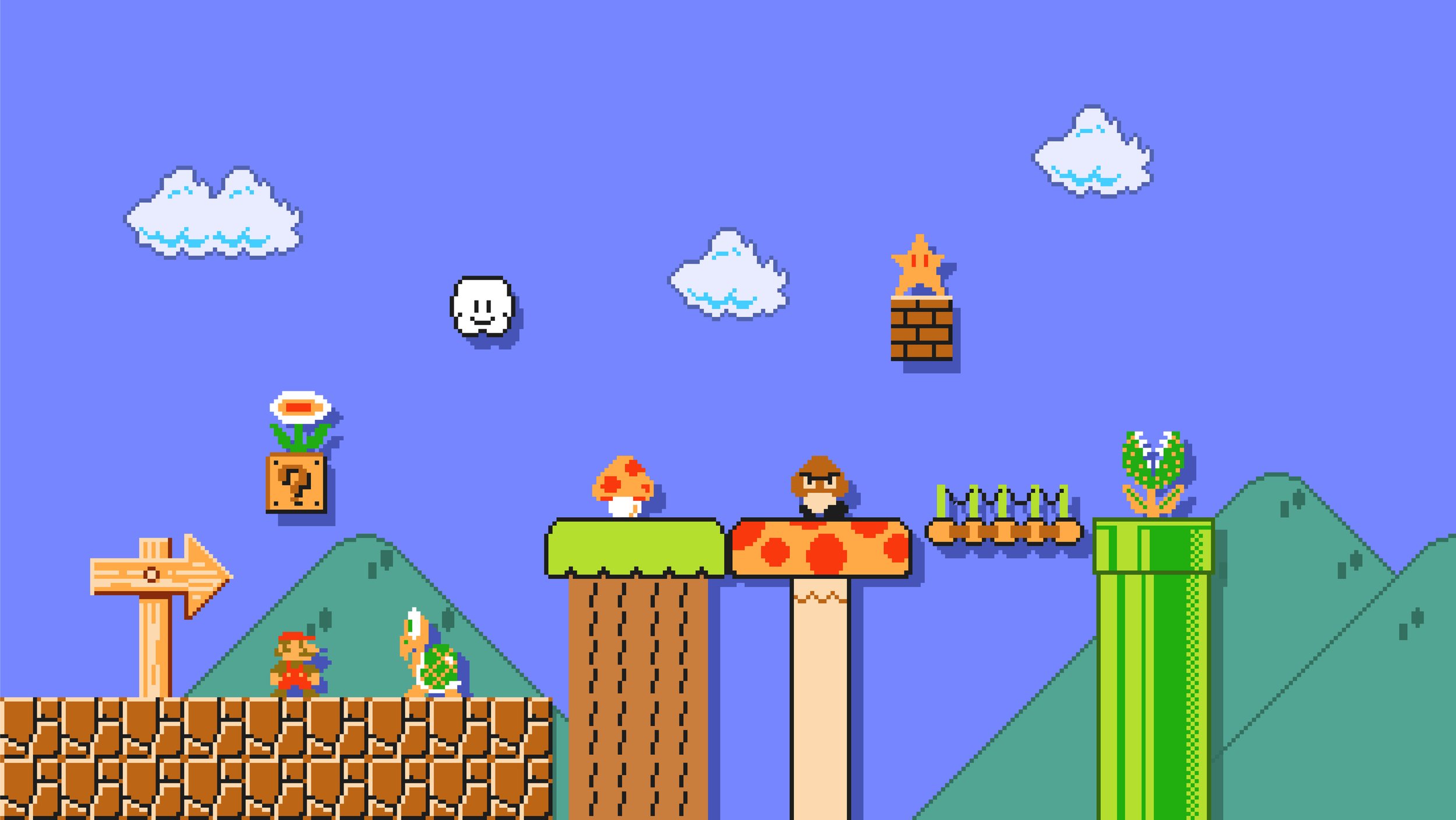
Low Five Education
Semiotic Domains and Learning Through Video Game Play
If you told somebody before 1985 that the character who would surpass Mickey Mouse in household popularity was an Italian plumber named Mario who travels through colorful worlds battling a giant dinosaur named Bowser that, once again, kidnapped a princess named Peach, you would have sounded insane. If you continued that he is aided by a helpful and significantly more cute dinosaur named Yoshi, and a small mushroom human? named Toad, they probably wouldn’t continue listening when you explained that Mario gets bigger when he eats mushrooms or can shoot fireballs when he eats a red flower. Why is it exactly that Mario eats mushrooms to gain power or an extra life, but also stomps on different mushrooms that are his enemies working under the tutelage of Bowser? It doesn’t really matter because the Super Mario games are fun and the characters and world they inhabit are cuter than heck. We accept all absurdities and ignore reasonable truths of life, aka basic logic, when we play video games in a phenomena lovingly called video game logic. When taken seriously you’ll learn that although video game logic is often goofy, it also serves as an example of ingenious game design. The developers are teaching you how to interact with their world, which means that you are definitely learning. I’m not here to tell you that your kids need to learn about Mario, but there are tons of games that actually teach valuable content through their gameplay and they could really help school come alive for our students.
Practice Makes Perfect
The way in which players learn while engaging with video games is best described by academic researcher and author James Paul Gee as being fluent in a semiotic domain. A semiotic domain is a fancy way of saying the context that gives sets of words, images, actions or values meaning. Think of the nuance of which a Chef can talk about and understand cooking or how a carpenter understands intricacies of building compared to the average person. Gee argues that video games are immersive experiences where the player is learning through the game's images, actions, environments, and game play experience. There are so many different kinds of video games so this plays out in big and small ways. Sometimes you have to solve complex riddles or challenges within a game, while in other situations it is key to effectively communicate with other players in order to meet common goals. Both statements sound a bit like school right? There is tons to be said about the learning process of playing even entertainment focused games, but the two main directions I’d like to highlight in bringing video games to school are how Semiotic Domains help us understand the way games help teach us to learn, followed by the way the games’ environments can teach specific content or skills though gameplay emersion.
People like playing video games and many people enjoy being good at video games. This can range from simply wanting to get to the next level of a game all the way to competing within the growing ESports industry as a pro. Like any skill or concept in life, we need to practice and gain more experience to get better. In school this is often accomplished by destroyer of fun and good times, homework. Conversely, Video games have a clever way of teaching the player in a way that is fun and engaging. This started pragmatically when games were played in arcades and players had to pay for each session. Would the player want to keep paying for your game if they didn’t know what was going on or couldn’t even get to the next level? Now games are popularly played at home so the question is more centered around how we can keep the player interested and engaged with the games that are increasingly more complex? In a classroom you have to layer content to students at an accessible pace or you risk totally losing them. Similarly with a video game you can’t just throw the kitchen sink at players or else you’ll overwhelm them. The best games are hailed for teaching their players how to play them in ways where the player isn’t even aware that they’re learning. You get better step by step and soon you’ve mastered the concepts in order to finish the compelling story of the game, to be better than your friends, or simply to have fun and explore everything the game has to offer. In education we talk all the time about teaching life skills of perseverance and active problem solving, yet we struggle because kids honestly don’t get to choose to be in school and are often not fully invested in their learning. Interestingly, in video games those mindsets are seamlessly engrained. Today one of the most popular and most successful developers in gaming is FromSoftware, who have become famous for their difficult games that don’t hold players' hands and force them to slowly grind their way through challenge after challenge as they figure out the game world on their own. In these games the player has come to expect and happily accept the fact that they will struggle, and for a long time fail, to get past the intense challenges within the game. Nothing comes easy and you will frequently be defeated by even the most simple enemies within the game. Mastery comes over time and the intense grind to get there is a main feature of the experience. Admittedly, FromSoft games would be terrible in schools given the content is violent and non academic in nature, but they do highlight the obstacles and challenges a person is willing to go through when they’re having fun. The key would be selecting games that are still fun for the player, but have relatable academic content for students to learn through.
Learning Through Games
Like any other form of media or art, video games are incredibly diverse and are often reflections of culture, history, or human curiosity. A game like Fortnite might get all the headlines and induce eyerolls, but there are also thriving genres of more complex games that would be awesome in schools. When you play a game you're engaging with an interactive tool. Within the games you often read, interact with maps in dynamic ways, and figure out complex puzzles and challenges. Gameplay offers experiences for the player that excites while also giving them familiarity and fluidity with critical thinking skills and analysis. Games involve a great deal of strategy and as previously mentioned, developers are very good at teaching the player how to master strategies within the game so it feels natural or more accessible. We want kids thinking critically and trying out new ideas every day. Video games have a way to deliver that while still providing actual academic content that is important within required school subjects.
As a social studies teacher I have a soft spot for simulation and strategy games because they relate so much to my academic content area and offer such creative challenges. Within the simulation/strategy genre are subgenres of city building, settlement, and management simulations. Many of these games are created based on historical settings, current realities, or imaginative situations of the future or alternate reality. To be cheesy, they make learning come alive. Within 8th grade Global Studies I teach geography skills, the importance of natural resources, cause and effect, and government systems. Within many of these games you need to analyze geography, manage resources, consider the weight of your choices, and effectively govern. Many of the systems in these games aren’t perfect or totally accurate on the count of needing to be fun and engaging to the player, but they still offer tons of good content. The imperfections of games actually provide interesting teaching moments and jumping off points for critical classroom conversations.
Friendly Suggestions for Games in the Classroom
Video games shouldn’t and never will replace all of the curriculum within a classroom, but they are powerful tools that if properly implemented, would excite and engage students within multiple units throughout the year. What’s important is that the right games are selected and that teachers understand them. A shop teacher who can’t operate a band saw would be a disaster, similarly (although admittedly less dramatically) a teacher who just throws a game in front of students would find limited success. Here are a few friendly suggestions of games that would do a great job of teaching students how to learn, as well as providing them engaging class content.
Top Recommendations
Cities Skylines (Middle to High School Social Studies)
I have a lot to say about this game. Cities Skylines is the modern, more polished successor of the classic SimCity franchise and it's my top choice due to everything it can offer to a social studies classroom. The process of designing, building, and maintaining your own growing city has been proven to be plenty fun (just look at its sales), but more important to this conversation is how it makes topics that are seemingly mundane like traffic management, city services, and city zoning fun and engaging. The city building simulation offers a sandbox for students to play and experiment within. Pair that with intentional teaching and you could be rewarded with an extremely fun and productive class. As a teacher you would also have a surprising availability of resources to support you in teaching some of the nuances within the game thanks to its thriving user communities that happily teach concepts and support other user inquiries. Personally speaking I’ve found myself watching videos for in-game problem solving, to figure out the best ways to alleviate traffic, and have used user posted content on popular forums for design inspiration. Additions to the game also highlight environmentally friendly design choices that offer a great opportunity for teachers to engage kids on environmental concepts ranging from providing citizens with public green spaces to designing cities around 100% renewable energy. If more schools started engaging students with Cities Skylines within the classroom we might just be inspiring and fostering the next generation of civil engineers, or at least providing students with a greater understanding of their own communities.
Imagine Earth (Middle/High School Social Studies or Science)
Speaking from experience, climate change is a needed but complex subject to cover in schools. The topic couldn’t be more important to learn about, but admittedly it's complex and a harsh reality a lot of students and adults would rather avoid than address. Imagine Earth addresses climate change head on as a compelling core component of the game leaving students and teachers plenty to talk about as they play through the game. You start off the game leading a settlement group off of Earth, which due to climate change, has been left polluted and bare. Tasked with setting up a new colony on a different planet, players' choices become key. Will they mismanage the resources and overly pollute their second chance at sustainable civilization? Or will you balance the needs and growth of your people with what the environment can stand? Imagine Earth challenges players to preserve the quality of life for their inhabitants and establish a balance between growth and sustainability. Alongside analyzing choices made within the game, teachers could also highlight choices being made now or in the not too recent past. Imagine Earth provides a great opportunity to view and learn about climate change through a social studies lens as you focus on human action, economics , and resource management.
Tycoon Games (Middle School/Base Economics)
Tycoon games refers to the style of game popularized by Roller Coaster Tycoon and/or Zoo Tycoon where the player builds, maintains and operates fun businesses like amusement parks and zoos. These games are appealing and a bit more accessible to younger middle school to late elementary students, whereas the previously highlighted games would be best for older levels of middle school and above. There are different types of these Tycoon games, but the main draw here is the way in which these games can help introduce and drive home economic concepts. Yes you could spend time just building crazy things, but with proper support and planning the classroom could focus more on making successful financial decisions that allow for a profitable park including setting prices and building at a sustainable pace. Furthermore, newer titles within the zoo focus of this genre have also integrated compelling game play choices around protecting and reintroducing endangered species to their natural habitats.
Assassins Creed (Discovery Mode for use in High School Social Studies)
In the Assassin's Creed Franchise you play as a time traveling assassin fighting against an evil corporation/cult that seeks to dominate the world. I’m not foolish to argue the use of the game within the classroom, but there is an incredible tool that has been developed from the game which is the discovery mode. Essentially these games have taken place in a diverse range of settings like ancient Greece and Egypt. The developers have been hailed for their incredible attention to detail in recreating these worlds and making them come to life. Used as a setting for this game, these might be some of the most realistic recreations we have of these cities and Discovery Mode allows players to explore and interact with them non-violently. There are some instances of teachers using this already, but if more commonly employed Discovery Mode could be used to greater engage and excite students.
Oregon Trail (Elementary Social Studies)
Although a bit obvious, what is this list without mention of the greatest educational game of all time? Hyperbole? Maybe, but also probably not. Generations have become painfully more aware of just how brutal the trek out to the American West really was for settlers. You may (fairly) find fault with the colonist nature of Westward expansion the game glorifies, but a confident and competent teacher could also use that as a compelling discussion point to engage their class with. Flaws often have a way of being some of the best ways to get a conversation started. Don’t have computers to play? The game has also been made into a card game.

